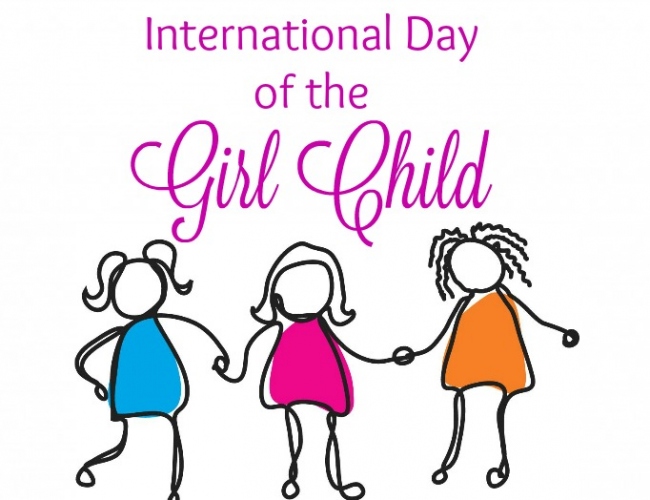This year’s theme for International Day of the Girl celebrated on October 11 across the world is ‘My voice, our equal future’, a striking call to recognize that while much progress has been made in the last two decades to ensure every girl is able to grow and develop in good health, there is much still to do

Every year on 11th October, the International Day of the Girl, UNICEF launches an annual campaign with girls to amplify their voices and stand up for their rights. This year’s theme is “My voice, our equal future”, seizing the opportunity to re-imagine a better world inspired by adolescent girls – energized and recognized, counted and invested in.
International Day of the Girl celebrates the importance, power, and potential of girls around the world.
It is also a day to highlight girls’ needs and the particular problems they can face, and drive efforts that meet these needs and fulfill their rights – not benevolently for them, but in partnership with them.
While much progress has been made in the last two decades to ensure every girl is able to grow and develop in good health, there is much still to do. For example, 12 million girls are married before age 18 each year. One in five girls globally has experienced sexual violence. In Eastern and Southern Africa, nearly 80% of new HIV infections among adolescents are among girls.
No decision for girls should be made without them
The 2020 theme of International Day of the Girl is “My voice, our equal future.” This is a striking call to recognize girls’ inheritance of the still-unfinished Beijing Agenda, their expertise on the challenges they face especially for their sexual and reproductive health and rights, and their limitless capacity as change-makers.
To commemorate the day, WHO co-organized a virtual intergenerational dialogue between girl advocates and high-level leaders about putting girls and their rights at the centre of decision-making processes.
Lubinda, a 15-year old advocate from Zambia, captured the sentiment of the event: “If every child can be given the chance to express themselves and talk about issues that are affecting them, then we can have a wide range of voices being represented.”
“At the same time, we have to be equipped with the knowledge, because without it, we will not be able to participate [in international systems].”
Walking the talk: meaningful youth engagement at WHO
“The health and wellbeing of girls is a priority for WHO,” said Dr Tedros Adhanom Ghebreyesus, WHO Director-General, at the virtual event.
“We have to come together to improve the lives and health of girls, but girls themselves must at the centre of that effort. I am happy to say that we will soon be launching a Youth Council to engage with the leadership of WHO on global health issues.”
Earlier this year, the WHO-UNICEF-Lancet Commission A future for the world’s children?, called for children and youth to be meaningfully engaged in decision making and policies that affect their health and their futures.
As a cosignatory of the Global Consensus Statement on Meaningful Adolescent and Youth Engagement, WHO is working with organizations within and outside the United Nations system to advocate for meaningful youth engagement and to support efforts in this area.
COVID-19 represents a huge challenge for adolescents and young people, and especially for girls and young women.
Young people need to be a key part of the solution to this global crisis, working jointly with their communities and health authorities to help break the chain of infection. >
“We need to have a conversation and the youth need to lead that conversation. The last thing a young person needs is an older person pontificating and wagging their finger. It never worked with me,” Dr Michael Ryan, Executive Director, WHO Health Emergencies Programme, recently said.
“We need to find better ways to engage young people. We need to give young people a responsibility and a voice in this, empower them, resource them to do it.”
Inclusive and relevant for the next generation
WHO strongly believes that by working with young people as equals at the local, regional and global levels, innovative solutions – to manage the current pandemic and other challenges now and in the future – can be found and put into action.
“We want…new policies that allow girls to speak up every day, not just on special days that mark an international movement,” said Rea, 17 years old, from Kosovo.
“While there are girls and young women reaching out for the stars and opening doors and opportunities, there are still a lot of doors that need keys to be opened.”